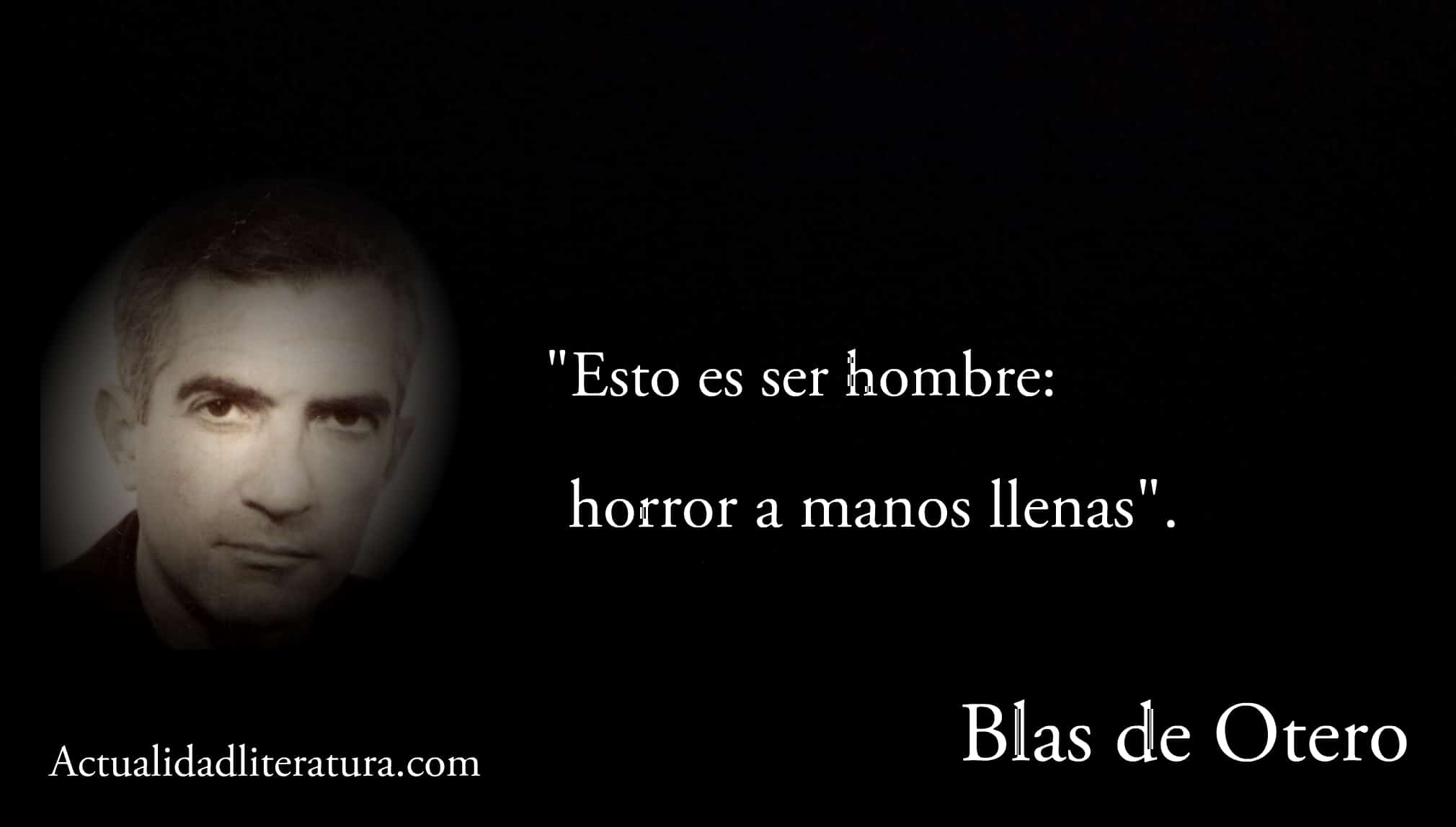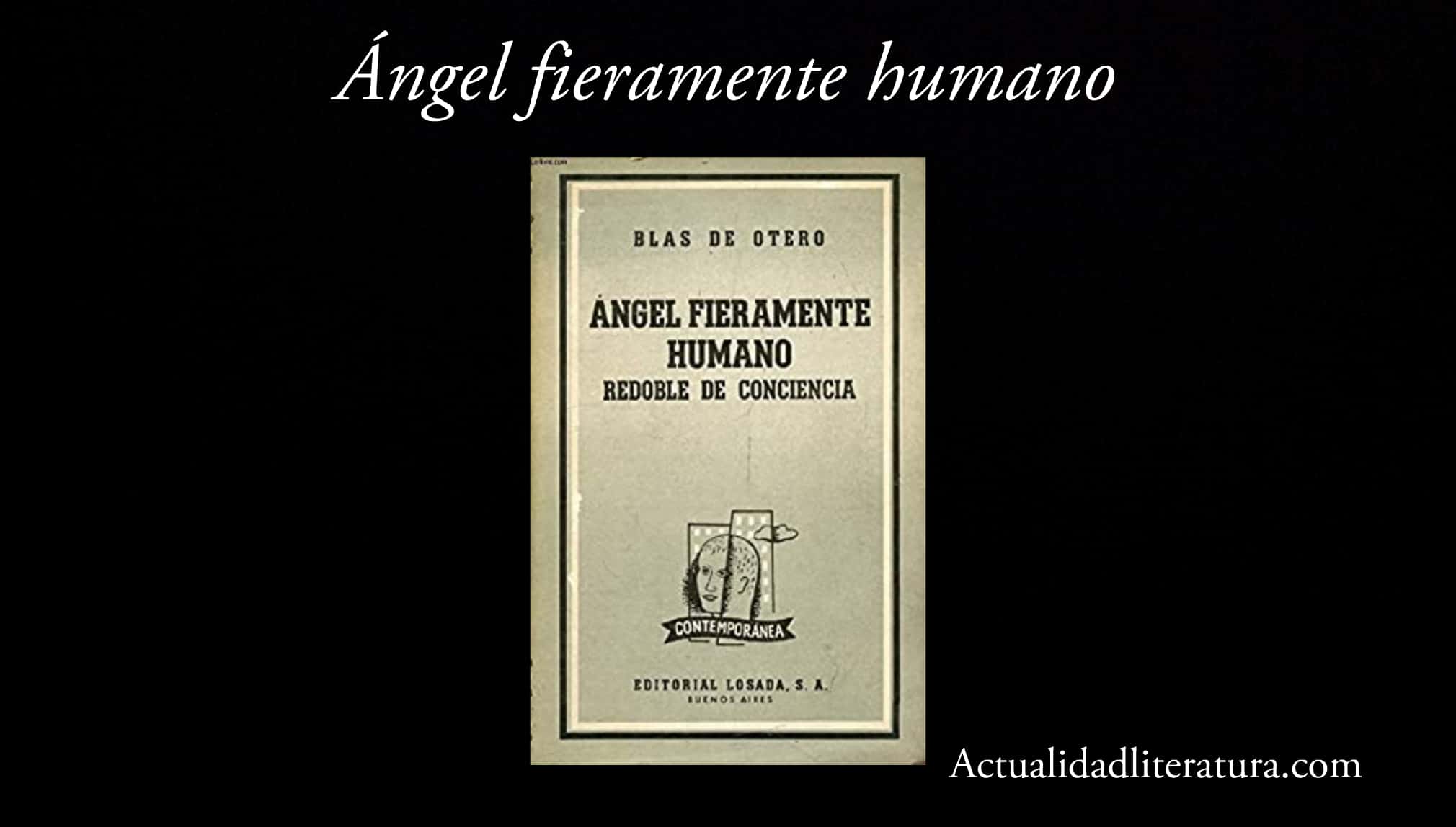
Phrase by Blas de Otero.
Blas de Otero (1916-1979) was a Spanish poet whose work is referred to as one of the most emblematic of committed postwar literature. Equally, the Bilbao writer is considered one of the greatest exponents of the so-called "internal exile”Emerged within Spain in the mid-twentieth century.
It is an intimate lyrical expression originated as a form of resistance to the prevailing socio-political situation during the Franco regime. In addition, Otero's influence on poets of later periods has been evident thanks to a very vast poetry in stylistic resources and his strong social commitment.
About his life
Blas de Otero Muñoz was born on March 15, 1916 into a wealthy family in Bilbao, Vizcaya. His primary studies were attended by Jesuit schools, where he received religious instruction (from which he moved away in his maturity). In 1927 he moved to Madrid together with his family, forced by the great economic depression of the interwar period.
In the Spanish capital he completed his baccalaureate and at the University of Valladolid he obtained his law degree. To tell the truth, he did little to practice this career (only in a Basque metallurgical company, after the Civil War). When he returned to Madrid he worked for a time as a university professor, but he abandoned his teaching work as soon as he began to be recognized for his poetry.
Construction
Most scholars divide Blas de Otero's literary creation into four periods. In each of them he reflected the personal vicissitudes of that moment. Although the most evident thing is the evolution of its approach from the “I” towards the “us”. That is, he went from personal afflictions to social (collective) or committed poetry.
Initial period

Fiercely human angel.
You can buy the book here: Fiercely human angel
Two unmistakable tendencies appear in the first poems of Blas de Otero. On one side, Among the poet's anguish, economic hardships and family losses become very marked. (his older brother and father) suffered when he was a teenager. In the same way, religiosity is a marked element within the motifs and lyrical composition.
Accordingly, it is quite palpable as the influx of poets such as San Juan de la Cruz and Fray Luis de León. However, Otero came to deny his religious stage, for which, he placed the beginning of his lyrical creation in Fiercely human angel (1950). Instead of Spiritual chant (1942), whose text reflects a frank communication between the first person of the poet and the divine "you".
Relevant aspects in Spiritual chant
- Divine love as a (paradoxical) source of joy and suffering.
- God manifested in concrete situations, but always unknowable, absolute and unattainable. Where faith is the only way that allows to aspire to salvation.
- Manifestation of a lost "I", helpless in the face of sin, a reflection of the imperfection of the human being.
- Death as an inscrutable guarantee of the encounter with God, therefore, the meaning of life is restricted to yearning to feel the presence of the Lord.
Second stage
Fiercely human angel, Roll of conscience (1950) and Anchor (1958), are the representative titles of the existentialist period of Otero. In them, the poet focuses mainly on his personal conflicts and the sorrows generated by the miseries of humanity. Furthermore, there is a certain "disappointment" in the stance of a "contemplative" God with the atrocities committed by men.
Although at this stage there are individual motivations, the concerns about their environment and the collective begin to be more persistent. Consequently, Otero's existentialism is clearly a breaking point with his old religious precepts and with Francoism. In fact, in the early 1950s, his approaches to leftist ideological positions are unquestionable.
Premises of existentialism with which Otero communed
- Man is finite, contained in a perishable body and can change his own existence through his decisions.
- There is no predestination, no souls, no gods that determine the path of men.
- Each person is responsible for their own actions and for their freedom.
- The man aware of his individual tragedy.
Third stage
Faced with the chaos and uncertainty prevailing in humanity, the poet's response is to adopt a compassionate, caring and supportive attitude to the victims of the disaster. In this way Otero's uprooted poetry arose, in which an approach towards “us” occurs to the detriment of individual needs.
Furthermore, at this stage, God has a role as a “terrible” spectator because he has left human beings helpless. Despite the neuralgic role of hope in the writings of this cycle, there is no solution from heaven. However, the greatest wishes are peace, freedom and the aspiration of a better future. Among the most representative works of this stage, the following stand out:
- I ask for peace and the word (1955)
- In Spanish (1959)
- What about Spain (1964)
The style and motifs of uprooted poetry
- Empathy towards other people as the exclusive way to overcome society and existential problems.
- The love frustrations.
- Explicit violence, drama, and deliberately abrupt changes between lines.
- Conceptual density, precision of the lexicon, ironic tones and cut rhythm.
Fourth stage

Faked and true stories.
You can buy the book here: Fake and true stories
The maximum expression of Otero's social and committed poetry comes after the poet's visits to the countries of the communist axis: USSR, China and Cuba. Some scholars consider this stage together with uprooted poetry as one. In any case, in this period the three poetic tenses used by the Spanish writer are much more notable:
- Historical past.
- Historical present.
- Utopian future.
Works like While Fake and true stories (both from 1970) demonstrate the versatility of the poet in this cycle. Well, he uses free verses, verses or semi-free, interchangeably, in poems that do not follow a pattern of constant length. This stage is also known as the “final stage”; since they were the last publications of Otero before dying on June 29, 1979.
Poems by Blas de Otero
I say live
Because living has become red hot.
(Always the blood, oh God, was red.)
I say live, live like nothing
should remain of what I write.
Because writing is a fugitive wind,
and publish, column cornered.
I say live, live by hand, angry-
mind die, quote from the stirrup.
I come back to life with my death on my shoulder,
abhorring everything I have written: rubble
of the man that I was when I was silent.
Now I return to my being, around my work
most immortal: that brave party
of living and dying. The rest is superfluous.
To the vast majority
Here you have, in song and soul, the man
the one who loved, lived, died inside
and one fine day he went down to the street: then
understood: and broke all his verses.
That's right, that's how it was. Went out one night
foaming at the eyes, drunk
of love, fleeing without knowing where:
Where the air doesn't stink of death
Peace tents, bright pavilions,
they were his arms, as he calls the wind;
waves of blood against the chest, huge
waves of hatred, see, all over the body.
Here! Arrive! Oh! Heinous angels
in horizontal flight they cross the sky;
hideous metal fish roam
the backs of the sea, from port to port.
I give all my verses for a man
in peace. Here you are, in the flesh,
my last will. Bilbao, eleven
April fifty-one.